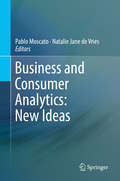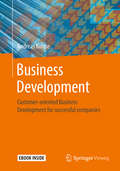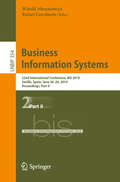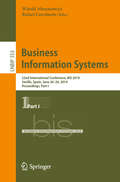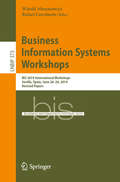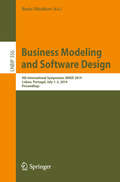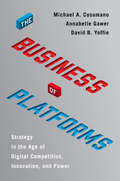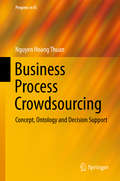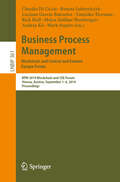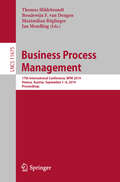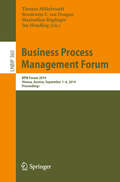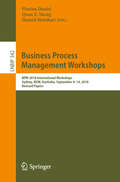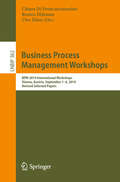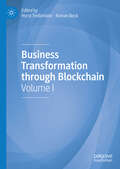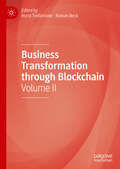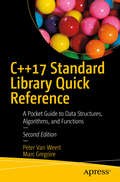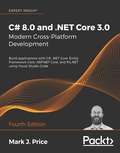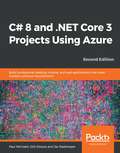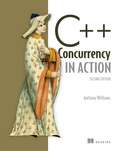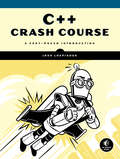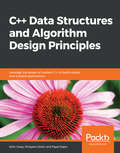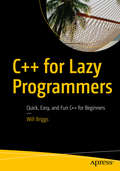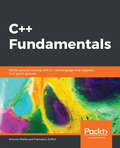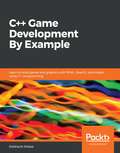- Table View
- List View
The Burden of Choice: Recommendations, Subversion, and Algorithmic Culture
by Jonathan CohnThe Burden of Choice examines how recommendations for products, media, news, romantic partners, and even cosmetic surgery operations are produced and experienced online. Fundamentally concerned with how the recommendation has come to serve as a form of control that frames a contemporary American as heteronormative, white, and well off, this book asserts that the industries that use these automated recommendations tend to ignore and obscure all other identities in the service of making the type of affluence they are selling appear commonplace. Focusing on the period from the mid-1990s to approximately 2010 (while this technology was still novel), Jonathan Cohn argues that automated recommendations and algorithms are far from natural, neutral, or benevolent. Instead, they shape and are shaped by changing conceptions of gender, sexuality, race, and class. With its cultural studies and humanities-driven methodologies focused on close readings, historical research, and qualitative analysis, The Burden of Choice models a promising avenue for the study of algorithms and culture.
Business and Consumer Analytics: New Ideas
by Pablo Moscato Natalie Jane de VriesThis two-volume handbook presents a collection of novel methodologies with applications and illustrative examples in the areas of data-driven computational social sciences. Throughout this handbook, the focus is kept specifically on business and consumer-oriented applications with interesting sections ranging from clustering and network analysis, meta-analytics, memetic algorithms, machine learning, recommender systems methodologies, parallel pattern mining and data mining to specific applications in market segmentation, travel, fashion or entertainment analytics. A must-read for anyone in data-analytics, marketing, behavior modelling and computational social science, interested in the latest applications of new computer science methodologies.The chapters are contributed by leading experts in the associated fields.The chapters cover technical aspects at different levels, some of which are introductory and could be used for teaching. Some chapters aim at building a common understanding of the methodologies and recent application areas including the introduction of new theoretical results in the complexity of core problems. Business and marketing professionals may use the book to familiarize themselves with some important foundations of data science. The work is a good starting point to establish an open dialogue of communication between professionals and researchers from different fields.Together, the two volumes present a number of different new directions in Business and Customer Analytics with an emphasis in personalization of services, the development of new mathematical models and new algorithms, heuristics and metaheuristics applied to the challenging problems in the field. Sections of the book have introductory material to more specific and advanced themes in some of the chapters, allowing the volumes to be used as an advanced textbook. Clustering, Proximity Graphs, Pattern Mining, Frequent Itemset Mining, Feature Engineering, Network and Community Detection, Network-based Recommending Systems and Visualization, are some of the topics in the first volume. Techniques on Memetic Algorithms and their applications to Business Analytics and Data Science are surveyed in the second volume; applications in Team Orienteering, Competitive Facility-location, and Visualization of Products and Consumers are also discussed. The second volume also includes an introduction to Meta-Analytics, and to the application areas of Fashion and Travel Analytics. Overall, the two-volume set helps to describe some fundamentals, acts as a bridge between different disciplines, and presents important results in a rapidly moving field combining powerful optimization techniques allied to new mathematical models critical for personalization of services. Academics and professionals working in the area of business anyalytics, data science, operations research and marketing will find this handbook valuable as a reference. Students studying these fields will find this handbook useful and helpful as a secondary textbook.
Business Development: Customer-oriented Business Development for successful companies
by Andreas KohneThe book provides a compact overview of the increasingly important topic of Business Development (BD). The author not only describes the role of the Business Development Manager and its tasks, but also shows how Business Development can be integrated organizationally into a company. In addition, a prototypical Business Development Process is presented in concrete terms and explained using a case study. The book shows why enterprises fail, deals with new creative techniques such as Hackthons and dedicates itself more comprehensively than so far to the topic of communication in the course of changes.The book helps all, which want to introduce and/or optimize Business Development in the enterprise as responsible ones or work in the future in this range.
Business Information Systems: 22nd International Conference, BIS 2019, Seville, Spain, June 26–28, 2019, Proceedings, Part II (Lecture Notes in Business Information Processing #354)
by Witold Abramowicz Rafael CorchueloThe two-volume set LNBIP 353 and 354 constitutes the proceedings of the 22nd International Conference on Business Information Systems, BIS 2019, held in Seville, Spain, in June 2019. The theme of the BIS 2019 was "Data Science for Business Information Systems", inspiring researchers to share theoretical and practical knowledge of the different aspects related to Data Science in enterprises. The 67 papers presented in these proceedings were carefully reviewed and selected from 223 submissions. The contributions were organized in topical sections as follows: Part I: Big Data and Data Science; Artificial Intelligence; ICT Project Management; and Smart Infrastructure. Part II: Social Media and Web-based Systems; and Applications, Evaluations and Experiences.
Business Information Systems: 22nd International Conference, BIS 2019, Seville, Spain, June 26–28, 2019, Proceedings, Part I (Lecture Notes in Business Information Processing #353)
by Witold Abramowicz Rafael CorchueloThe two-volume set LNBIP 353 and 354 constitutes the proceedings of the 22nd International Conference on Business Information Systems, BIS 2019, held in Seville, Spain, in June 2019. The theme of the BIS 2019 was "Data Science for Business Information Systems", inspiring researchers to share theoretical and practical knowledge of the different aspects related to Data Science in enterprises. The 67 papers presented in these proceedings were carefully reviewed and selected from 223 submissions. The contributions were organized in topical sections as follows: Part I: Big Data and Data Science; Artificial Intelligence; ICT Project Management; and Smart Infrastructure. Part II: Social Media and Web-based Systems; and Applications, Evaluations and Experiences.
Business Information Systems Workshops: BIS 2019 International Workshops, Seville, Spain, June 26–28, 2019, Revised Papers (Lecture Notes in Business Information Processing #373)
by Witold Abramowicz Rafael CorchueloThis book constitutes revised papers from the nine workshops and one accompanying event which took place at the 22nd International Conference on Business Information Systems, BIS 2019, held in Seville, Spain, in June 2019. There was a total of 139 submissions to all workshops of which 57 papers were accepted for publication. The workshops included in this volume are: AKTB 2019: 11th Workshop on Applications of Knowledge-Based Technologies in Business BITA 2019: 10th Workshop on Business and IT Alignment BSCT 2019: Second Workshop on Blockchain and Smart Contract Technologies DigEX 2019: First International Workshop on transforming the Digital Customer Experience iCRM 2019: 4th International Workshop on Intelligent Data Analysis in Integrated Social CRM iDEATE 2019: 4th Workshop on Big Data and Business Analytics Ecosystems ISMAD 2019: Workshop on Information Systems and Applications in Maritime Domain QOD 2019: Second Workshop on Quality of Open Data SciBOWater 2019: Second Workshop on Scientific Challenges and Business Opportunities in Water Management
Business Modeling and Software Design: 9th International Symposium, BMSD 2019, Lisbon, Portugal, July 1–3, 2019, Proceedings (Lecture Notes in Business Information Processing #356)
by Boris ShishkovThis book constitutes the refereed proceedings of the 9th International Symposium on Business Modeling and Software Design, BMSD 2019, held in Lisbon, Portugal, in July 2019. It contains 12 full and 11 short papers. BMSD is a leading international forum that brings together researchers and practitioners interested in business modeling and its relation to software design. Particular areas of interest are: Business Processes and Enterprise Engineering; Business Models and Requirements; Business Models and Services; Business Models and Software; Information Systems Architectures and Paradigms; Data Aspects in Business Modeling and Software Development; Blockchain-Based Business Models and Information Systems; IoT and Implications for Enterprise Information Systems. The theme of BMSD 2019 was: REFLECTING HUMAN AUTHORITY AND RESPONSIBILITY IN ENTERPRISE MODELS AND SOFTWARE SPECIFICATIONS.
The Business of Platforms: Strategy in the Age of Digital Competition, Innovation, and Power
by David B. Yoffie Michael A. Cusumano Annabelle GawerA trio of experts on high-tech business strategy and innovation reveal the principles that have made platform businesses the most valuable firms in the world and the first trillion-dollar companies. Managers and entrepreneurs in the digital era must learn to live in two worlds—the conventional economy and the platform economy. Platforms that operate for business purposes usually exist at the level of an industry or ecosystem, bringing together individuals and organizations so they can innovate and interact in ways not otherwise possible. Platforms create economic value far beyond what we see in conventional companies.The Business of Platforms is an invaluable, in-depth look at platform strategy and digital innovation. Cusumano, Gawer, and Yoffie address how a small number of companies have come to exert extraordinary influence over every dimension of our personal, professional, and political lives. They explain how these new entities differ from the powerful corporations of the past. They also question whether there are limits to the market dominance and expansion of these digital juggernauts. Finally, they discuss the role governments should play in rethinking data privacy laws, antitrust, and other regulations that could reign in abuses from these powerful businesses. Their goal is to help managers and entrepreneurs build platform businesses that can stand the test of time and win their share of battles with both digital and conventional competitors. As experts who have studied and worked with these firms for some thirty years, this book is the most authoritative and timely investigation yet of the powerful economic and technological forces that make platform businesses, from Amazon and Apple to Microsoft, Facebook, and Google—all dominant players in shaping the global economy, the future of work, and the political world we now face.
Business Process Crowdsourcing: Concept, Ontology And Decision Support (Progress in IS)
by Nguyen Hoang ThuanThis book conceptualises and develops crowdsourcing as an organisational business process. It argues that although for many organisations crowdsourcing still implies an immature one-off endeavour, when developed to a more repeatable business process it can harness innovation and agility. The book offers a process model to guide organisations towards the establishment of business process crowdsourcing (BPC), and empirically showcases and evaluates the model using two current major crowdsourcing projects. In order to consolidate the domain knowledge, the BPC model is turned into a heavyweight ontology capturing the concepts, hierarchical relationships and decision-making relationships necessary to establish crowdsourcing as a business process in an organisation. Lastly, based on the ontology it presents a decision tool that provides advice on making informed decisions about the performance of business process crowdsourcing activities.
Business Process Management: BPM 2019 Blockchain and CEE Forum, Vienna, Austria, September 1–6, 2019, Proceedings (Lecture Notes in Business Information Processing #361)
by Claudio Di Ciccio Renata Gabryelczyk Luciano García-Bañuelos Tomislav Hernaus Rick Hull Mojca Indihar Štemberger Andrea Kő Mark StaplesThis book constitutes the contributions presented at the Blockchain Forum and the Central and Eastern Europe Forum (CEE Forum) held at the 17th International Conference on Business Process Management, BPM 2019, which took place in Vienna, Austria, in September 2019.The Blockchain Forum deals with the use of blockchain for collaborative information systems. Conceptual, technical and application-oriented contributions are pursued within the scope of this theme. The Blockchain Forum received a total of 31 submissions; 10 full and 1 short paper were accepted for publication in this book. The objective of the CEE Forum is to foster discussion for BPM academics from Central and Eastern Europe to disseminate their research, compare results and share experiences. For the CEE Forum 16 submissions were received and 6 full and 2 short papers were accepted for publication.The book also contains one invited talk in full-paper length and 6 poster papers from the CEE Forum.
Business Process Management: 17th International Conference, BPM 2019, Vienna, Austria, September 1–6, 2019, Proceedings (Lecture Notes in Computer Science #11675)
by Thomas Hildebrandt Boudewijn F. van Dongen Maximilian Röglinger Jan MendlingThis book constitutes the proceedings of the 17th International Conference on Business Process Management, BPM 2019, held in Vienna, Austria, in September 2019. The 23 full and 4 tutorial short papers included in this volume were carefully reviewed and selected from 115 submissions. The papers were organized in topical sections named: foundations; engineering; and management.
Business Process Management Forum: BPM Forum 2019, Vienna, Austria, September 1–6, 2019, Proceedings (Lecture Notes in Business Information Processing #360)
by Thomas Hildebrandt Boudewijn F. van Dongen Maximilian Röglinger Jan MendlingThis book constitutes the proceedings of the BPM Forum held during the 17th International Conference on Business Process Management, BPM 2019, which took place in Vienna, Austria, in September 2019. The BPM Forum hosts innovative research which has a high potential of stimulating discussions. The papers selected for the forum are expected to showcase fresh ideas from exciting and emerging topics in BPM, even if they are not yet as mature as the regular papers at the conference. The 13 full papers included in this volume were carefully reviewed and selected from a total of 115 submissions. The papers were organized in topical sections named: specification; execution; analytics; and management.
Business Process Management Workshops: Bpm 2018 International Workshops Sydney, NSW, Australia, September 9–14, 2018, Revised Papers (Lecture Notes in Business Information Processing #342)
by Florian Daniel Quan Z. Sheng Hamid MotahariThis book constitutes revised papers from the eight International Workshops held at the 16th International Conference on Business Process Management, BPM 2018, in Sydney, Australia, in September 2018: BPI 2018: 14th International Workshop on Business Process Intelligence; BPMS2 2018: 11th Workshop on Social and Human Aspects of Business Process Management;‐ PODS4H 2018: 1st International Workshop on Process-Oriented Data Science for Healthcare; AI4BPM 2018: 1st International Workshop on Artificial Intelligence for Business Process Management; CCBPM 2018: 1st International Workshop on Emerging Computing Paradigms and Context in Business Process Management; BP-Meet-IoT / PQ 2018: Joint Business Processes Meet the Internet-of-Things and Process Querying Workshop; DeHMiMoP 2018: 1st Declarative/Decision/Hybrid Mining and Modelling for Business Processes Workshop; REBM /EdForum 2018: Joint Requirements Engineering and Business Process Management Workshop and Education Forum The 45 full papers presented in this volume were carefully reviewed and selected from 90 submissions.
Business Process Management Workshops: BPM 2019 International Workshops, Vienna, Austria, September 1–6, 2019, Revised Selected Papers (Lecture Notes in Business Information Processing #362)
by Chiara Di Francescomarino Remco Dijkman Uwe ZdunThis book constitutes revised papers from the twelve International Workshops held at the 17th International Conference on Business Process Management, BPM 2019, in Vienna, Austria, in September 2019:The third International Workshop on Artificial Intelligence for Business Process Management (AI4BPM)The third International Workshop on Business Processes Meet Internet-of-Things (BP-Meet-IoT)The 15th International Workshop on Business Process Intelligence (BPI)The first International Workshop on Business Process Management in the era of Digital Innovation and Transformation (BPMinDIT)The 12th International Workshop on Social and Human Aspects of Business Process Management (BPMS2)The 7th International Workshop on Declarative, Decision and Hybrid approaches to processes (DEC2H)The second International Workshop on Methods for Interpretation of Industrial Event Logs (MIEL)The first International Workshop on Process Management in Digital Production (PM-DiPro)The second International Workshop on Process-Oriented Data Science for Healthcare (PODS4H)The fourth International Workshop on Process Querying (PQ)The second International Workshop on Security and Privacy-enhanced Business Process Management (SPBP)The first International Workshop on the Value and Quality of Enterprise Modelling (VEnMo)Each of the workshops discussed research still in progress and focused on aspects of business process management, either a particular technical aspect or a particular application domain. These proceedings present the work that was discussed during the workshops.
Business Transformation through Blockchain: Volume I
by Roman Beck Horst TreiblmaierThis edited collection offers a number of contributions from leading scholars investigating Blockchain and its implications for business. Focusing on the transformation of the overall value chain, the sections cover the foundations of Blockchain, its drivers and barriers, business modelling and a range of examples from industry. Using a number of theoretical and methodological approaches, this innovative publication aims to further the cause of this ground-breaking technology and its use within information technology, supply chain and wider business management research.
Business Transformation through Blockchain: Volume II
by Roman Beck Horst TreiblmaierThe second volume of this edited collection offers a number of contributions from leading scholars investigating Blockchain and its implications for business. Focusing on the transformation of the overall value chain, the sections cover the foundations of Blockchain and its sustainability, social and legal applications. It features a variety of use cases, from tourism to healthcare. Using a number of theoretical and methodological approaches, this innovative publication aims to further the cause of this ground-breaking technology and its use within information technology, supply chain and wider business management research.
C++17 Standard Library Quick Reference: A Pocket Guide to Data Structures, Algorithms, and Functions
by Peter Van Weert Marc GregoireThis quick reference is a condensed guide to the essential data structures, algorithms, and functions provided by the C++17 Standard Library. It does not explain the C++ language or syntax, but is accessible to anyone with basic C++ knowledge or programming experience. Even the most experienced C++ programmer will learn a thing or two from it and find it a useful memory-aid. It is hard to remember all the possibilities, details, and intricacies of the vast and growing Standard Library. This handy reference guide is therefore indispensable to any C++ programmer. It offers a condensed, well-structured summary of all essential aspects of the C++ Standard Library. No page-long, repetitive examples or obscure, rarely used features. Instead, everything you need to know and watch out for in practice is outlined in a compact, to-the-point style, interspersed with practical tips and well-chosen, clarifying examples. This new edition is updated to include all Standard Library changes in C++17, including the new vocabulary types std::string_view, any, optional, and variant; parallel algorithms; the file system library; specialized mathematical functions; and more.What You Will LearnGain the essentials that the C++ Standard Library has to offerUse containers to efficiently store and retrieve your dataInspect and manipulate your data with algorithms See how lambda expressions allow for elegant use of algorithmsDiscover what the standard string class provides and how to use itWrite localized applicationsWork with file and stream-based I/OPrevent memory leaks with smart pointersWrite safe and efficient multi-threaded code using the threading librariesWho This Book Is ForAll C++ programmers, irrespective of their proficiency with the language or the Standard Library. A secondary audience is developers who are new to C++, but not new to programming, and who want to learn more about the C++ Standard Library in a quick, condensed manner.
C# 8.0 and .NET Core 3.0 – Modern Cross-Platform Development - Fourth Edition: Build applications with C#, .NET Core, Entity Framework Core, ASP.NET Core, and ML.NET using Visual Studio Code, 4th Edition
by Mark J. PriceReaders with some prior programming experience or with a science, technology, engineering, or mathematics (STEM) background, who want to gain a solid foundation with C# 8.0 and .NET Core 3.0.
C# 8 and .NET Core 3 Projects Using Azure: Build professional desktop, mobile, and web applications that meet modern software requirements
by Dirk Strauss Jas Rademeyer Paul MichaelsGet up to speed with using C# 8 and .NET Core 3.0 features to build real-world .NET Core applications Key Features Learn the core concepts of web applications, serverless computing, and microservices Create an ASP.NET Core MVC application using controllers, routing, middleware and authentication Build modern applications using cutting-edge services from Microsoft Azure Book Description .NET Core is a general-purpose, modular, cross-platform, and opensource implementation of .NET. The latest release of .NET Core 3 comes with improved performance and security features, along with support for desktop applications. .NET Core 3 is not only useful for new developers looking to start learning the framework, but also for legacy developers interested in migrating their apps. Updated with the latest features and enhancements, this updated second edition is a step-by-step, project-based guide. The book starts with a brief introduction to the key features of C# 8 and .NET Core 3. You'll learn to work with relational data using Entity Framework Core 3, before understanding how to use ASP.NET Core. As you progress, you'll discover how you can use .NET Core to create cross-platform applications. Later, the book will show you how to upgrade your old WinForms apps to .NET Core 3. The concluding chapters will then help you use SignalR effectively to add real-time functionality to your applications, before demonstrating how to implement MongoDB in your apps. Finally, you'll delve into serverless computing and how to build microservices using Docker and Kubernetes. By the end of this book, you'll be proficient in developing applications using .NET Core 3. What you will learn Understand how to incorporate the Entity Framework Core 3 to build ASP.NET Core MVC applications Create a real-time chat application using Azure's SignalR service Gain hands-on experience of working with Cosmos DB Develop an Azure Function and interface it with an Azure Logic App Explore user authentication with Identity Server and OAuth2 Understand how to use Azure Cognitive Services to add advanced functionalities with minimal code Get to grips with running a .NET Core application with Kubernetes Who this book is for This book is for developers and programmers of all levels who want to build real-world projects and explore the new features of .NET Core 3. Developers working on legacy desktop software who are looking to migrate to .NET Core 3 will also find this book useful. Basic knowledge of .NET Core and C# is assumed.
C++ Concurrency in Action
by Anthony WilliamsSummaryThis bestseller has been updated and revised to cover all the latest changes to C++ 14 and 17! C++ Concurrency in Action, Second Edition teaches you everything you need to write robust and elegant multithreaded applications in C++17.Purchase of the print book includes a free eBook in PDF, Kindle, and ePub formats from Manning Publications.About the TechnologyYou choose C++ when your applications need to run fast. Well-designed concurrency makes them go even faster. C++ 17 delivers strong support for the multithreaded, multiprocessor programming required for fast graphic processing, machine learning, and other performance-sensitive tasks. This exceptional book unpacks the features, patterns, and best practices of production-grade C++ concurrency.About the BookC++ Concurrency in Action, Second Edition is the definitive guide to writing elegant multithreaded applications in C++. Updated for C++ 17, it carefully addresses every aspect of concurrent development, from starting new threads to designing fully functional multithreaded algorithms and data structures. Concurrency master Anthony Williams presents examples and practical tasks in every chapter, including insights that will delight even the most experienced developer. What's insideFull coverage of new C++ 17 featuresStarting and managing threadsSynchronizing concurrent operationsDesigning concurrent codeDebugging multithreaded applicationsAbout the ReaderWritten for intermediate C and C++ developers. No prior experience with concurrency required.About the AuthorAnthony Williams has been an active member of the BSI C++ Panel since 2001 and is the developer of the just::thread Pro extensions to the C++ 11 thread library.Table of ContentsHello, world of concurrency in C++!Managing threadsSharing data between threadsSynchronizing concurrent operationsThe C++ memory model and operations on atomic typesDesigning lock-based concurrent data structuresDesigning lock-free concurrent data structuresDesigning concurrent codeAdvanced thread managementParallel algorithmsTesting and debugging multithreaded applications
C++ Crash Course: A Fast-Paced Introduction
by Josh LospinosoA fast-paced, thorough introduction to modern C++ written for experienced programmers. After reading C++ Crash Course, you'll be proficient in the core language concepts, the C++ Standard Library, and the Boost Libraries.C++ is one of the most widely used languages for real-world software. In the hands of a knowledgeable programmer, C++ can produce small, efficient, and readable code that any programmer would be proud of.Designed for intermediate to advanced programmers, C++ Crash Course cuts through the weeds to get you straight to the core of C++17, the most modern revision of the ISO standard. Part 1 covers the core of the C++ language, where you'll learn about everything from types and functions, to the object life cycle and expressions. Part 2 introduces you to the C++ Standard Library and Boost Libraries, where you'll learn about all of the high-quality, fully-featured facilities available to you. You'll cover special utility classes, data structures, and algorithms, and learn how to manipulate file systems and build high-performance programs that communicate over networks. You'll learn all the major features of modern C++, including: • Fundamental types, reference types, and user-defined types • The object lifecycle including storage duration, memory management, exceptions, call stacks, and the RAII paradigm • Compile-time polymorphism with templates and run-time polymorphism with virtual classes • Advanced expressions, statements, and functions • Smart pointers, data structures, dates and times, numerics, and probability/statistics facilities • Containers, iterators, strings, and algorithms • Streams and files, concurrency, networking, and application developmentWith well over 500 code samples and nearly 100 exercises, C++ Crash Course is sure to help you build a strong C++ foundation.
C++ Data Structures and Algorithm Design Principles: Leverage the power of modern C++ to build robust and scalable applications
by John Carey Shreyans Doshi Payas RajanGet started with C++ programming by learning how to build applications using its data structures and algorithms Key Features Explore data structures such as arrays, stacks, and graphs with real-world examples Study the trade-offs between algorithms and data structures and discover what works and what doesn't Discover how techniques such as bloom filters and multi-way heaps boost real-world applications Book Description C++ is a mature multi-paradigm programming language that enables you to write high-level code with a high degree of control over the hardware. Today, significant parts of software infrastructure, including databases, browsers, multimedia frameworks, and GUI toolkits, are written in C++. This book starts by introducing C++ data structures and how to store data using linked lists, arrays, stacks, and queues. In later chapters, the book explains the basic algorithm design paradigms, such as the greedy approach and the divide-and-conquer approach, which are used to solve a large variety of computational problems. Finally, you will learn the advanced technique of dynamic programming to develop optimized implementations of several algorithms discussed in the book. By the end of this book, you will have learned how to implement standard data structures and algorithms in efficient and scalable C++ 14 code. What you will learn Build applications using hash tables, dictionaries, and sets Explore how modern hardware affects the actual run-time performance of programs Apply common algorithms such as heapsort and merge sort for string data types Use C++ template metaprogramming to write code libraries Implement a URL shortening service using a bloom filter Use appropriate modern C++ idioms such as std:: array instead of C-style arrays Who this book is for This book is for developers or students who want to revisit basic data structures and algorithm design techniques. Although no mathematical background is required, basic knowledge of complexity classes and Big O notation along with a qualification in an algorithms course will help you get the most out of this book. Familiarity with C++ 14 standard is assumed.
C++ for Lazy Programmers: Quick, Easy, and Fun C++ for Beginners
by Will BriggsLearn C++ the quick, easy, and “lazy” way. This book is an introductory programming text that uses humor and fun to make you actually willing to read, and eager to do the projects -- with the popular C++ language.C++ for Lazy Programmers is a genuinely fun learning experience that will show you how to create programs in the C++ language. This book helps you learn the C++ language with a unique method that goes beyond syntax and how-to manuals and helps you understand how to be a productive programmer. It provides detailed help with both the Visual Studio and g++ compilers plus their debuggers, and includes the latest version of the language, C++17, too. Along the way you’ll work through a number of labs: projects intended to stretch your abilities, test your new skills, and build confidence. You'll go beyond the basics of the language and learn how build a fun C++ arcade game project. After reading and using this book, you’ll be ready for your first real-world C++ application or game project on your own. What You Will LearnProgram for the first time in C++ in a fun, quick and easy mannerDiscover the SDL graphics and gaming libraryWork with SSDL, the Simple SDLwrapper libraryUse the most common C++ compilers: Visual Studio, and g++ (with Unix or MinGW)Practice “anti-bugging” for easy fixes to common problems Work with the debuggerAcquire examples-driven concepts and ideas Build a C++-based arcade game application Apply built-in Standard Template Library (STL) functions and classes for easy and efficient programmingDip your toe in C, C++'s ancestor, still extensively used in industryUse new C++11/14/17 features including lambda functions, constexpr, and smart pointersWho This Book Is ForThose who are new to C++, either as a guide for self-learners or as an accessible textbook for students in college-level courses.
C++ Fundamentals: Hit the ground running with C++, the language that supports tech giants globally
by Francesco ZoffoliThis book is for professional developers who want to learn a new, powerful language; and students who are ready to enter into the industry. Software developers familiar with older C++ standards, who want to update their knowledge to the modern paradigms of C++11, C++14 and C++17, are also welcome. This book is aimed at anyone passionate about programming, and who is ready to grasp a powerful yet complex language.
C++ Game Development By Example: Learn to build games and graphics with SFML, OpenGL, and Vulkan using C++ programming
by Siddharth ShekarExplore modern game programming and rendering techniques to build games using C++ programming language and its popular librariesKey FeaturesLearn how you can build basic 2D and complex 3D games with C++Understand shadows, texturing, lighting, and rendering in 3D game development using OpenGLUncover modern graphics programming techniques and GPU compute methods using the Vulkan APIBook DescriptionAlthough numerous languages are currently being used to develop games, C++ remains the standard for fabricating expert libraries and tool chains for game development. This book introduces you to the world of game development with C++.C++ Game Development By Example starts by touching upon the basic concepts of math, programming, and computer graphics and creating a simple side-scrolling action 2D game. You'll build a solid foundation by studying basic game concepts such as creating game loops, rendering 2D game scenes using SFML, 2D sprite creation and animation, and collision detection. The book will help you advance to creating a 3D physics puzzle game using modern OpenGL and the Bullet physics engine. You'll understand the graphics pipeline, which entails creating 3D objects using vertex and index buffers and rendering them to the scene using vertex and fragment shaders. Finally, you'll create a basic project using the Vulkan library that'll help you get to grips with creating swap chains, image views, render passes, and frame buffers for building high-performance graphics in your games.By the end of this book, you’ll be ready with 3 compelling projects created with SFML, the Vulkan API, and OpenGL, and you'll be able take your game and graphics programming skills to the next level.What you will learnUnderstand shaders and how to write a basic vertex and fragment shaderBuild a Visual Studio project and add SFML to itDiscover how to create sprite animations and a game character classAdd sound effects and background music to your gameGrasp how to integrate Vulkan into Visual StudioCreate shaders and convert them to the SPIR-V binary formatWho this book is forIf you’re a developer keen to learn game development with C++ or get up to date with game development, this book is for you. Some knowledge of C++ programming is assumed.

